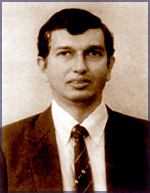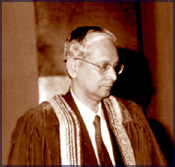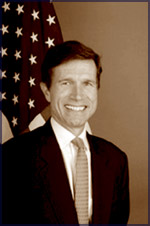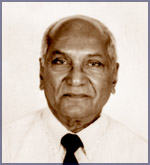|

The Organisation of Professional Associations
of Sri Lanka
Annual Sessions 2007
‘Sri Lankans Reawakening Sri Lanka as
Paradise Isle’
September 14, 15 and 16 at BMICH
[Organization of Professional Associations]
Message from Guest of Honour Ariyaseela
Wickremanayake:
‘Common future with such optimism’
“I consider it a privilege to be associated with the Annual Sessions
of the Organisation of Professional Associations on the theme
“Reawakening Sri Lanka as Paradise Isle”. It is indeed heartening to
note that the OPA, the apex body of professionals in Sri Lanka, views
our common future with such optimism.
The word “Reawakening” implies that our current problems are the
result of disinterest and languor. That we as a nation are in a deep
slumber. Is this basic premise correct? In all humility I fuly subscribe
to this view.
Let us look at some fundamental facts. Sri Lanka is assured of twelve
hours of sunlight daily. The monsoons bring us ample rainfall that we
have no scarcity of water to meet our needs.
The soil is fertile. Yet even after nearly sixty years of
independence we still spend US$ 2000 million annually on food imports.
This is our major expenditure and together with the oil import bill
consumes 90% of our national income.
Whilst exploiting our offshore fossil fuel resources may take a few
more years we can cut our food import drastically in a few months of
dedicated effort. Our farmers are unable to derive the benefits of their
labour due to failures in distribution and marketing.
Our system is however able to transport even fresh fruits and
vegetables across the ocean from China and Australia and market them
locally. Is n’t there something fundamentally wrong with our system?
Whilst it is easy to blame the politicians (indeed they are to be
blamed), civil societies in Sri lanka is too complacent and leave the
entirety of governance and development in the hands of the politicians.
The intelligentsia and the professionals must play a much bigger
leadership role if our society is to progress.
We have the resources, both human and natural. Our failure is in
mobilizing this potential.
The efforts of the OPA to focus on these issues are therefore indeed
timely and commendable. I urge the OPA to sustain this initiative with a
continuing effort to mobilize our society to implement the many
innovative proposals that will emerge at these annual sessions.
Let all of us stop complaining about the darkness that currently
surrounds and each light a lamp to dispel it.”
‘Out come of Sessions should be used for development’
Message from OPA president - Dr. Hillary W.M. Cooray:
 “It
is indeed a pleasure to send this message to the 20th Annual Sessions of
the Organisation of Professional Associations the first of which was
held under the Presidency of Architect Surath Wickremasinghe. “It
is indeed a pleasure to send this message to the 20th Annual Sessions of
the Organisation of Professional Associations the first of which was
held under the Presidency of Architect Surath Wickremasinghe.
“Over the years we have had Annual Sessions ranging on various
subjects such as, Education, Health, Good Governance, Economic
Development, Public Interest Litigation and others.
This year our President-Elect Elmore Perera has selected an all
encompassing subject “Sri Lankans Re-Awakening Sri Lanka as Paradise
Isle” which is most appropriate in the context of the present socio,
cultural, economic and political scenario in the country.”
“It is hoped that the outcome of the Sessions will be used by the
Policy Makers, Ministers and all other Agencies who are responsible for
the development and good governance of our country.
I wish the Annual Sessions very fruitful deliberations”.
-----------------------------------
Message from Chief Guest, Justice Mark Fernando P.C.:
‘Challenging, programme of work’
 “My
sincere thanks to the Organisation of Professional Associations for
inviting me for the Ceremonial Induction of its 20th Annual Sessions. I
congratulate the OPA and its Committees on the ambitious and challenging
programme of work they have undertaken in the national interest, in
order to galvanise “Sri Lankans to Re-awaken Sri Lanka as Paradise
Isle”. “My
sincere thanks to the Organisation of Professional Associations for
inviting me for the Ceremonial Induction of its 20th Annual Sessions. I
congratulate the OPA and its Committees on the ambitious and challenging
programme of work they have undertaken in the national interest, in
order to galvanise “Sri Lankans to Re-awaken Sri Lanka as Paradise
Isle”.
I offer my best wishes to the OPA for a very fruitful and rewarding
sessions.”
Message from Guest of Honour US Ambassador Robert
O’Blake:
‘OPA policies aimed to benefit Lankans of all backgrounds’
 “I
am honoured to be Guest of Honour at this year’s 20th annual sessions of
the Organisation of Professional Associations of Sri Lanka. “I
am honoured to be Guest of Honour at this year’s 20th annual sessions of
the Organisation of Professional Associations of Sri Lanka.
As a national organisation committed to representing professionals
from almost every industry in Sri Lanka, the OPA has been a linchpin in
fostering participation between the business community, civil society,
and the general public.
Since its inception more than 30 years ago, the OPA has consistently
advanced economic, social, and development policies aimed to benefit Sri
Lankans of all backgrounds.
Serving as an avenue for professionals to channel their ides and
skills to the government, the OPA is a fine example of how the business
sector contributes more than just goods and services in a democratic
society.
The OPA’s efforts to ensure that government is accountable,
transparent, and efficient are vital to helping eliminate corruption,
improve the quality of life, and build a better future. I commend the
OPA’s dedication and its significant contributions to “Reawakening Sri
Lanka as a Paradise Isle”.
Message from President Elect and Chairman Annual
Session, Elmore Perera:
‘Integrated, home-grown long-term planning imperative’
 “When
Ceylon was granted independence in 1948, several racial, linguistic,
religious and cultural groups co-existed in amity as equal ‘Ceylonese’. “When
Ceylon was granted independence in 1948, several racial, linguistic,
religious and cultural groups co-existed in amity as equal ‘Ceylonese’.
Proceedings in Parliament were dignified, educative and productive.
In-built checks and balances facilitated ‘Good Governance’ of 12 million
people by a Cabinet of 12 Ministers. The Judiciary upheld the Rule of
Law and held the scales even, without fear or favour. It was Lee Kuan
Yew’s declared aim “to make Singapore another Ceylon.”
Almost 60 years later, however, all checks and balance have been
dismantled or rendered ineffective. Corruption is rampant. Good
Governance and the Rule of Law are only talked about.
The most lucrative investment in Sri Lanka today, is getting elected
to Parliament, where proceedings are a farcical disgrace. According to a
recent editorial “Nearly 40 per cent of Sri Lanka’s Budget goes down the
gargler because of waste and corruption.”
A few days ago, Lee Kuan Yew reflected that “In 1965, we had 20 years
of examples of failed states. So we knew what to avoid - racial
conflict, linguistic strife, and religious conflict. We saw Ceylon.
Thereafter, we knew that if we embarked on any of these romantic ideas,
to revive a mythical past of greatness and culture, we’d be damned.”
The OPA was established in 1975, inter alia, to fill the void caused
by the abolition of the Senate in 1972. We, professionals believe that
integrated, home-grown, long-term planning is imperative for the country
to move out of its present predicament.
Nearly, 300 professionals of irrefutable expertise, with decades of
experience in the local and international arena, have, during the last
six months, devoted thousands of hours in committee to develop a
National Plan that is apolitical and will stand the test of time, in
this era of globalisation.
Most of us are products of the ‘Free Education we have received in
this country and therefore are obliged to avail of, what is perhaps the
last opportunity to ‘Reawaken Sri Lanka as Paradise Isle’ and prevent a
permanent state of anarchy.
These Anual Sessions is only the first step.
We appeal to all Sri Lankans, to support our endeavour to realise our
goal.”
Questions and Answers
1. Payment of W&OP to
Children-Correction to Answer on Daily News of 23/8/2007
Several readers have inquired from us whether unmarried children are
entitled for the pension of their father in the event of the death of
their father. We have inquired from the Director General of Pensions who
has replied to us as follows:
“On the death of the father, mother is entitled for widows and
orphans pension. Further in the event of the death of the mother
children below the age of 26 years can claim the pension.
This is applicable to both the male and female children. Children
above the age of 26 years can obtain the pension only if a Medical Board
recommends to the effect they are totally disabled. There is no
provision for unmarried children above the age of 26 years to obtain the
pension of their father.
2. Liaison Office
Question: I am an employee attached to an office of an
Overseas Company. (Liaison Office). The office was registered in the
year 2005 under special provision of the then Companies Act. I shall be
thankful to you if you could let me know:
* Whether the Liaison Office should be re-register under the
Companies Act 2007.
* Whether there is any payment to be made to the Registrar of
Companies annually.
* The Liaison Office is not involved in my trading or business
activities as per the undertaking given to the Registrar of Companies.
Hence it does not maintain a Tax File. Under such circumstances what is
the method of accounting for PAYE and WHT.
Nihal Perera, Colombo 5.
Answer: If the Company was registered earlier, it has to be
re-registered under the new Companies Act of 2007. The payment to be
made is Rs. 5000. As the Liaison Office is registered under the
Companies Act, the Company will have to arrange with the Department of
Inland Revenue (PAYE Branch) and obtain the relevant registration.
Firstly the Company has to obtain a Taxpayer Information Number (TIN)
No. the company has to complete the relevant application form, which can
be collected from the Department of Inland Revenue and submit it along
with the following documents.
1. No. 48 Relevant to the Company
2. No. 65 Relevant to the Company
3. No. 36 Relevant to the Company
4. Memorandum and Articles of the Company duly certified
3. Debt Recovery
Legislation
Question: I have mortgaged my property to a bank to obtain a
loan for a third party. This party has defaulted payment and the Bank
has now taken action under the provisions of the debt recovery
legislation to auction my property. Will I be able to seek relief under
the normal laws applicable for the recovery of Loans.
G.P.W. De Silva - Ahangama
Answer: Under the Debt Recovery Act No. 04 of 1990 private
Banks can auction any property, movable or immovable, and recover any
loan which has been defaulted. The Board of Directors of the Bank will
first pass a resolution for the sale of the property and publish in the
gazette and newspapers.
If no response is received from the client they will proceed to
publish the Notice of sale. Before the sale is registered the client can
seek relief in the District Court of the area where the property is
situated.
However, as the debt recovery provisions are included in the act of
Incorporation of state Banks, a client who seeks relief from court
should do so soon after the publication of the resolution to sell the
property.
National policy on Environment
Continued from last week
Air Pollution:
1. Accelerate the national programmes of dissemination of improved
fuel wood stoves, and solar cookers, suited to local cooking practices.
2. Strengthen the monitoring and enforcement of emission standards
for both point and non-point sources, with participation in monitoring
by the local communities.
3. Prepare and implement action plans for major cities for addressing
air pollution for both point and non-point sources, relying on a
judicious combination of fines and incentive based instruments.
4. Formulate a national strategy for urban transport to ensure
adequate investment, public and private, in low-pollution mass transport
systems.
5. Promote reclamation of wastelands by energy plantations for rural
energy through multi stakeholder partnerships involving the land owning
agencies, local communities, and investors.
Soil Pollution:
1. Develop and implement viable models of public-private partnerships
for setting up and operating time based, restricted landfills and
incinerators for toxic and hazardous waste, both industrial and
biomedical, on payment by users, taking the concerns of local
communities into account. The concerned local communities must have
clear entitlements to specified benefits from hosting such sites.
2. Develop and implement strategies for clean up of pre-existing
toxic and hazardous waste dumps, in particular, in industrial areas, and
reclamation of such lands for future sustainable use.
3. Strengthen the capacities of local bodies for reducing, reusing,
segregation, recycling of municipal solid wastes, and setting up and
operating commercial composting sites with minimized residual waste
reaching an environmentally sound disposal site, in particular through
competitive responsible partnerships for solid water management
services.
4. Give legal recognition to, and strengthen the informal sector
systems of collection and recycling of various materials; in particular
enhance their access to institutional finance and relevant technologies.
5. Promote organic farming of traditional crop varieties through
research in and dissemination of techniques for reclamation of land with
prior exposure to agricultural chemicals, facilitating marketing of
organic produce in Sri Lanka and abroad, including by development of
transparent, voluntary, science-based labelling schemes.
Noise Pollution:
1. Make appropriate distinctions between different environments in
terms of setting ambient noise standards, e.g. rural versus urban;
educational and medical establishments versus other areas; nighttime
versus daytime in residential areas; areas in the vicinity of road,
rail, and airport infrastructure; etc.
2. Distinguish between noise standards and protection measures in the
context of occupational exposure, and environmental exposure to third
parties.
3. Formulate noise emissions norms (e.g. loudspeaker, automobile
horns, fireworks ratings) appropriate to various activities to ensure
that exposure levels to third parties who are not participants in the
activity do not exceed prescribed ambient standards.
4. Encourage dialogue between State/Local Authorities and
religious/community representatives on the adoption of enforceable
specific durations, timings, and use of loudspeakers/fireworks, etc. in
case temporary exceeding of prescribed ambient noise standards for
observance of traditional religious/cultural social events cannot be
avoided. Concluded
Some suggestions to eradicate/reduce levels of bribery and
corruption
Continued from last week
General
Recommendations
* Another way of mobilizing public opinion, is to set up a website in
all three languages and provide information to the public on what is
being done, and have downloadable PDF files on “What You Can Do to Stop
Corruption” for use in schools and civic society groupings. In fact,
there could be teach-ins and travelling road shows to various
electorates. All of this will naturally put a lot of pressure in favour
of clean government.
* Have the Government ratify the UN Convention Against Bribery and
pass implementing legislation that updates existing statutes. Have the
Government adopt the UNCITRAL Model Law on Procurement of Goods
Construction and Services (presently being updated at UNCITRAL).
* The Attorney General’s office has to be strengthened to become a
constitutional office. A hot line on the web site guaranteeing
confidentiality to whistle-blowers needs to be established. Consider
rewarding whistle blowers if the claims are proven. “Tell Shell” is a
key feature of Shell Internationals corporate ethics program. Here,
Shell employees are encouraged to report all incidents of bribery and
corruption to Senior Management.
* A strong media is essential. Honest and factual reporting by the
press and wide media and TV coverage on corruption issues will change
the mindset of the citizens and they will vote politicians out if they
are found to be corrupt. Citizens need to get more proactive, be more
concerned and do their part in arresting corruption.
* To bring about a reawakening among the citizens of Sri Lanka and to
do everything possible to dispel the present feeling of “hopelessness”.
* To formulate a plan to ensure that all foreign aid and grants are
closely monitored by responsible persons and audited by professionals.
The disappearance of funds donated to assist Tsunami victims is a case
in point.
7. Singapore Model
It is strongly recommended that since the Sri Lankan Commission to
Investigate Allegations Of Bribery or Corruption Act No 19 of 1994 is
not effective or has failed, serious consideration should be given to
introducing legislature on the lines of Singapore’s Corrupt Practices
Investigation Bureau (CPIB) established in 1952 and which derives its
powers of investigation from the Prevention of Corruption Act (Chapter
241) (PCA).
CPIB is very well organised and its reputation for being extremely
efficient and professional, is legendary. It is the number one agency
for combating corruption in South East Asia.
The Bureau is headed by a director who is directly responsible to the
Prime Minister.
Singapore enjoys an international reputation as a country in which
corruption is under control. Foreign delegations visit CPIB regularly to
study their practices and methodology to fight corruption.
Transparency International has ranked Singapore as amongst the top 5
least corrupt countries in the world. CPIB applies its laws ruthlessly,
without fear or favour, and it is reported that over the years, three
Ministers of Parliament have been prosecuted for corrupt practices.
This is indeed a far cry to what is happening in Sri Lanka. One
Minister was administratively stripped of all his public appointments,
another committed suicide and the third was sentenced to 4.5 years
imprisonment.
CPIB is well structured, acts speedily, gives total protection to
Whistle Blowers, works closely with the citizens and every senior office
is manned by highly skilled and dedicated personnel. For a comprehensive
account of CPIB and PCA, visit their website www.cpib.gov.sg.
Concluded
The ceremonial inauguration on 14.9.2007 will commence at 5.30 p.m.
The chief guest will be Justice Mark Fernando PC. The guests of honour
will be Robert O’Blake, Ambassador for the USA and Ariyaseela
Wickremanayake, Chairman Mawbima Foundation. All registrants and
invitees are kindly requested to be in their seats by 5.30 p.m.
All are welcome to register at the OPA till 4 p.m. on Friday,
September 14 or thereafter at the BMICH.
275/75, Prof. Stanley Wijesundera Mawatha, off Bauddhaloka Mawatha,
Colombo 7.
Tel: 2580268, 2501721. Tel/Fax: 2559770. E-mail: [email protected] /
[email protected]
Web: www.opasrilanka.com |

